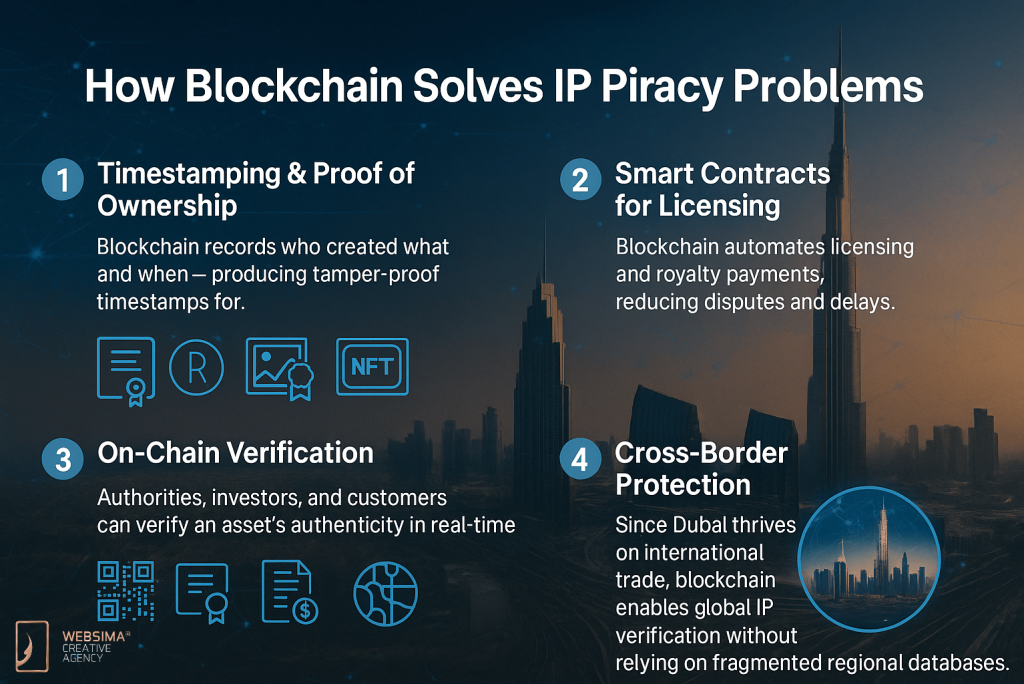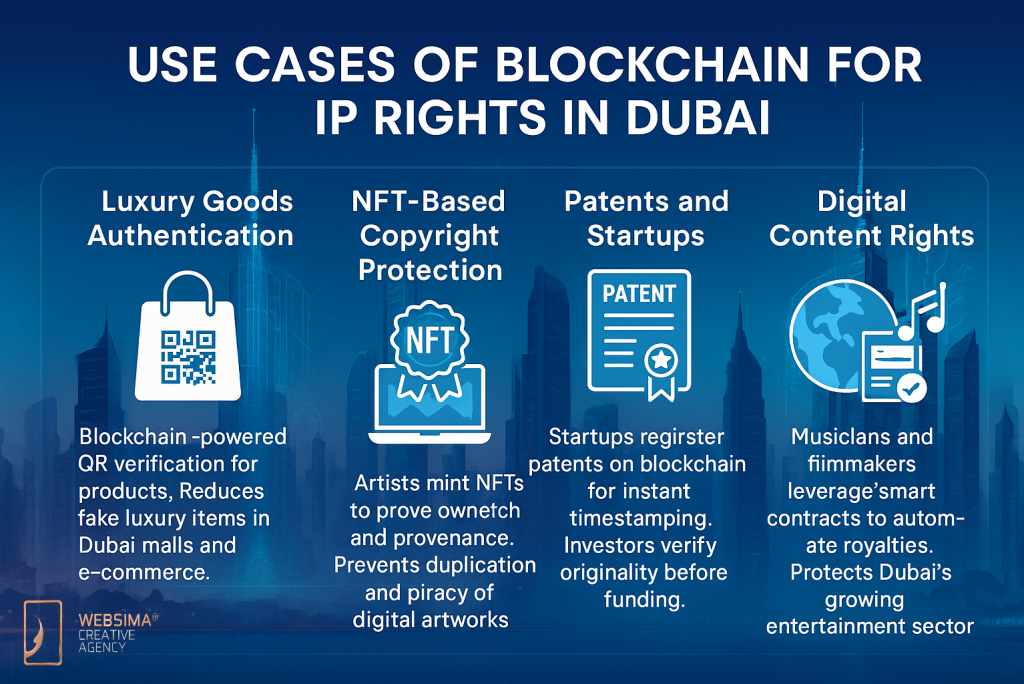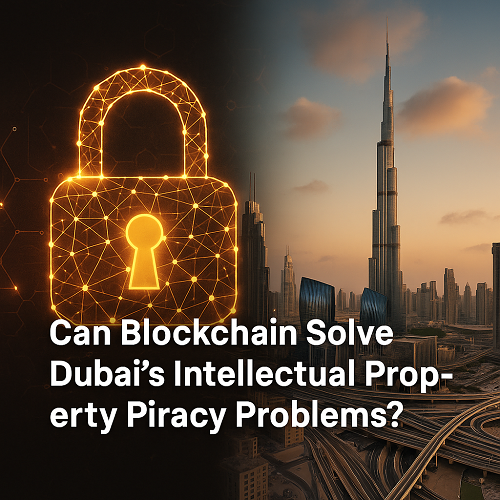Table of Contents
- Introduction
- The Growing Challenge of Intellectual Property Piracy in Dubai
- Why Traditional IP Enforcement Falls Short
- How Blockchain Solves IP Piracy Problems
- Real-World Blockchain Applications in IP Protection
- Dubai’s Push for IP Security and Digital Transformation
- Use Cases of Blockchain for IP Rights in Dubai
- Benefits of Using Blockchain for IP Protection
- Challenges and Limitations
- Future Outlook: Blockchain-Powered IP Ecosystem in Dubai
- FAQs
- Conclusion
- Websima CTA
Introduction
Dubai’s rapid growth into a global innovation hub has made it a center for intellectual property (IP) creation across sectors like technology, fashion, digital content, and luxury goods. However, this success comes with a challenge: intellectual property piracy.
According to the World Intellectual Property Organization (WIPO), counterfeiting and piracy cost the global economy over $500 billion annually. Dubai, as a regional trade and innovation hub, is particularly exposed to fake luxury goods, pirated software, and digital content theft.
The UAE is using Cardano
At the World Police Summit in Dubai, Dubai Police unveiled a pilot using Cardano to securely store and share forensic evidence (like bullet scan data) with other agencies, including Interpol.
The blockchain ensures integrity and tamper-resistant… pic.twitter.com/OL5qil3jE1— Redline (@praxor_io) August 31, 2025
The emirate is now looking to blockchain technology to timestamp, verify, and enforce IP rights more effectively — positioning itself at the forefront of IP protection innovation.
The Growing Challenge of Intellectual Property Piracy in Dubai
Dubai’s open economy, bustling trade zones, and booming luxury retail sector have made it a target for counterfeiters and digital pirates.
Key Areas Affected by IP Piracy
- Luxury Goods & Fashion: Counterfeit watches, bags, and apparel sold online and offline.
- Software & Digital Content: Pirated apps, media, and SaaS solutions circulating freely.
- Technology & Startups: Patent violations affecting blockchain, AI, and fintech innovations.
- NFTs & Web3 Assets: Fake NFTs undermining Dubai’s thriving Web3 ecosystem.
Despite strict IP laws and active enforcement by Dubai Customs, existing mechanisms can’t keep up with real-time piracy in a hyper-connected economy. As an example, blockchain as digital passport for UAE luxury products, can enhance the intellectual property in the luxurious market significantly.
Why Traditional IP Enforcement Falls Short
Dubai has strong regulations through:
- The UAE Federal Law on Trademarks and Patents
- Dubai Customs’ IP Rights Protection Program
- Free-zone frameworks like Dubai Multi Commodities Centre (DMCC)
But traditional enforcement faces limitations:
- Manual verification delays slow down enforcement.
- Global piracy networks exploit jurisdiction gaps.
- Limited transparency in IP registration databases.
- High litigation costs discourage startups and creators from pursuing claims.
This is where blockchain technology can make a paradigm shift.
How Blockchain Solves IP Piracy Problems

Blockchain acts as an immutable, transparent ledger for IP registration, tracking, and enforcement.
1. Timestamping & Proof of Ownership
Blockchain records who created what and when — producing tamper-proof timestamps for:
- Trademarks
- Patents
- Digital artworks
- Music and videos
2. On-Chain Verification
Authorities, investors, and customers can verify an asset’s authenticity in real-time using:
- QR codes
- Smart contracts
- NFT-based certificates
3. Smart Contracts for Licensing
Blockchain automates licensing and royalty payments, reducing disputes and delays. DIFC and ADGM takes care of smart contract and dispute resolution
4. Cross-Border Protection
Since Dubai thrives on international trade, blockchain enables global IP verification without relying on fragmented regional databases.
Real-World Blockchain Applications in IP Protection
- IBM’s IP Ledger: IBM developed a blockchain-based IP registry for innovators and startups to protect patents and trademarks.
- WIPO Blockchain Initiatives: The World Intellectual Property Organization is piloting blockchain to secure global IP registries.
- Luxury Goods Blockchain Alliance (AURA): Used by brands like Louis Vuitton and Bulgari to track and authenticate high-value goods.
Dubai is well-positioned to integrate these global standards into its own IP ecosystem.
Dubai’s Push for IP Security and Digital Transformation
Dubai is already leading regional innovation in IP protection:
- Dubai Customs IP Rights Protection Division: Actively monitors imports and e-commerce channels for counterfeits.
- Dubai Courts’ Blockchain Initiative: Pilots the timestamping of legal documents to prevent tampering.
- Dubai Blockchain Strategy: Integrates blockchain into 100% of government services by 2030, including IP management.
Source: Dubai Blockchain Strategy
Use Cases of Blockchain for IP Rights in Dubai

1. Luxury Goods Authentication
- Blockchain-powered QR verification for products.
- Reduces fake luxury items in Dubai malls and e-commerce.
2. NFT-Based Copyright Protection
- Artists mint NFTs to prove ownership and provenance.
- Prevents duplication and piracy of digital artworks.
3. Patents and Startups
- Startups register patents on blockchain for instant timestamping.
- Investors verify originality before funding.
4. Digital Content Rights
- Musicians and filmmakers leverage smart contracts to automate royalties.
- Protects Dubai’s growing entertainment sector.
Benefits of Using Blockchain for IP Protection
- Immutable Proof: Ownership records can’t be altered.
- Real-Time Verification: Authorities, marketplaces, and consumers confirm authenticity instantly.
- Global Accessibility: Dubai integrates with cross-border IP registries seamlessly.
- Lower Enforcement Costs: Automation reduces dependency on manual investigations.
- Investor Confidence: Startups secure funding more easily with tamper-proof IP data.
Challenges and Limitations
Despite its promise, blockchain adoption faces hurdles:
- Legal recognition gaps in international jurisdictions.
- High onboarding costs for small creators and startups.
- Scalability issues for large-scale IP registries.
- Consumer education on verifying authenticity.
Dubai’s proactive approach, however, positions it to overcome these barriers faster than most markets.
Future Outlook: Blockchain-Powered IP Ecosystem in Dubai
By 2030, Dubai could pioneer a global IP protection framework powered by blockchain:
- Unified IP registries across Dubai Customs, DMCC, and WIPO.
- NFT-based digital identity for creators and inventors.
- Smart contracts for borderless IP licensing.
- AI-integrated IP monitoring tools for automated piracy detection.
Dubai’s vision aligns with becoming the innovation capital of the Middle East, making blockchain adoption not just optional — but inevitable.
FAQs
Q1. How does blockchain secure IP rights?
It provides tamper-proof timestamps, transparent ownership, and on-chain verification, making it impossible to falsify records.
Q2. Can blockchain stop counterfeit luxury goods in Dubai?
Yes — brands can authenticate products using QR-linked blockchain records, helping authorities and consumers instantly detect counterfeits.
Q3. How does this help startups?
Blockchain ensures proof of originality, attracting investors and simplifying licensing negotiations.
Q4. Can blockchain help enforce cross-border IP rights?
Absolutely. Blockchain creates a unified, global record of ownership that is verifiable across jurisdictions, streamlining international IP enforcement.
Q5. How can creators and artists benefit from blockchain in Dubai?
Dubai-based creators can mint NFTs or blockchain certificates for their art, music, or digital works, proving authenticity and automating royalty payments.
Conclusion
Dubai’s position as a global innovation hub demands a future-ready solution to intellectual property piracy. Blockchain technology bridges this gap, providing transparent, immutable, and verifiable records for patents, trademarks, and creative works.
From luxury goods authentication to NFT-based copyrights and smart licensing, Dubai is set to lead the global fight against IP piracy.
Let Websima Secure Your IP With Blockchain
At Websima, we specialize in designing blockchain-powered IP protection solutions for businesses, creators, and innovators.
We help you:
- Register and timestamp IP assets securely on blockchain.
- Build NFT-based certificates for copyrights and digital works.
- Deploy smart contracts for automated licensing and royalties.
Protect your intellectual property today — Contact Websima to secure your ideas before they’re compromised.





